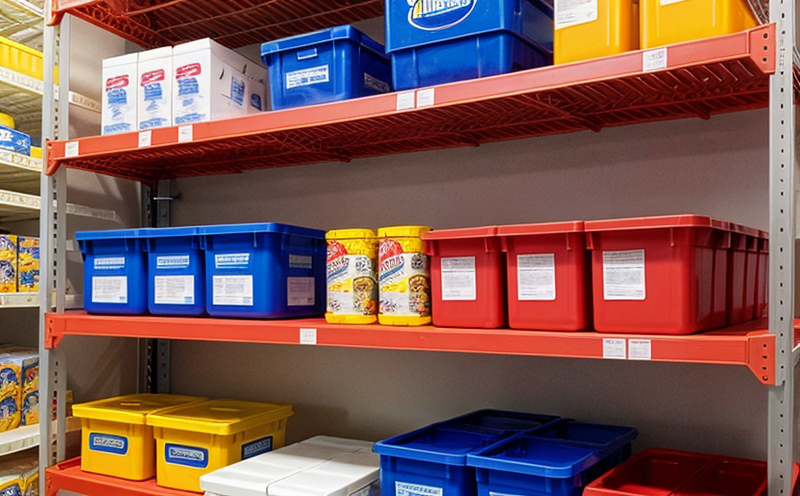ISO 68172 Real-Time Stability Studies in Soft Drinks
The ISO 68172 standard for real-time stability studies is designed to evaluate the shelf life and chemical stability of soft drinks. This process ensures that products meet quality standards throughout their lifecycle, from production to consumption. Shelf-life testing is critical for ensuring product safety, maintaining taste, appearance, and nutritional integrity over extended periods.
For quality managers and compliance officers at beverage companies, this test provides essential data on the stability of ingredients and additives under real-world storage conditions. By simulating actual shelf life, the ISO 68172 method helps predict how a product will perform in store shelves or consumer homes over time. This information is invaluable for maintaining brand reputation and meeting regulatory requirements.
The testing protocol involves storing samples at various temperatures and humidity levels to mimic real-world conditions during transportation and storage. The goal is to identify any adverse effects on the product's quality, such as color changes, taste alterations, or loss of nutritional value. This comprehensive approach ensures that products remain safe and enjoyable for consumers.
For R&D engineers, this test offers valuable insights into ingredient compatibility and potential formulation issues. By identifying stability challenges early in the development process, they can make informed decisions to enhance product longevity without compromising taste or safety.
The procedure involves rigorous sampling protocols that ensure consistency across batches. Samples are stored under conditions that reflect real-world scenarios, including temperature fluctuations and exposure to light. The test duration varies based on the expected shelf life of the product but typically ranges from 3 to 6 months for soft drinks.
Compliance officers benefit significantly from this testing by ensuring adherence to regulatory standards such as ISO 68172. This helps in avoiding recalls and penalties, which could otherwise result in significant financial losses.
In summary, the ISO 68172 real-time stability studies for soft drinks are essential tools that safeguard product quality and compliance with industry best practices. They provide critical data needed to maintain consistent product performance throughout its lifecycle.
Scope and Methodology
| Parameter | Description |
|---|---|
| Sample Preparation | Homogenized samples are prepared according to ISO 68172 guidelines. |
| Storage Conditions | Temperature ranges from -5°C to +40°C, humidity levels of 35-90%, and exposure to light. |
| Testing Frequency | Daily checks for physical and chemical changes over the study period. |
| Data Collection | Recording all observed changes in appearance, flavor, and nutritional content. |
The ISO 68172 standard requires that samples be stored under controlled conditions to simulate real-world scenarios. The testing process involves regular checks of the samples' physical properties (color, viscosity), chemical composition, and sensory attributes (taste, odor). These observations help in determining whether any changes occur over time.
The test duration can vary depending on the expected shelf life but typically ranges from 3 to 6 months. During this period, detailed records are kept for each batch of samples tested. This includes documenting any observed changes and comparing them against baseline measurements taken at the start of the study.
At the conclusion of the testing phase, a comprehensive report is prepared summarizing all findings. Compliance officers use these reports to ensure that products meet both internal quality standards and external regulatory requirements. The data obtained from this test can also be used by R&D teams to refine formulations if necessary.
Why Choose This Test
- Ensure long-term product stability under real-world conditions.
- Meet regulatory requirements and avoid recalls or penalties.
- Identify potential issues early in the development process to refine formulations.
- Preserve brand reputation by delivering consistent product quality.
- Enhance consumer trust through transparent testing practices.
- Support sustainable business operations by minimizing waste and resource usage.
The ISO 68172 real-time stability studies provide a robust framework for evaluating the shelf life of soft drinks. By choosing this test, companies can gain valuable insights into product behavior under various environmental conditions, thereby enhancing their ability to maintain consistent quality standards throughout the supply chain.
Use Cases and Application Examples
The ISO 68172 real-time stability studies are widely used in the beverage industry. They provide essential data for ensuring product safety, maintaining taste, appearance, and nutritional integrity over extended periods.
- Beverage Manufacturers: Use these tests to monitor how ingredients and additives behave under different storage conditions.
- R&D Teams: Leverage the findings from this test to refine formulations and improve product quality.
- Quality Assurance Personnel: Ensure that all batches meet both internal and external standards for safety and efficacy.
- Compliance Officers: Use the data obtained from these tests to confirm compliance with relevant regulations.
A classic example of using this test is in the development of new flavors. By exposing samples to different environmental conditions, developers can identify any potential issues early on and make adjustments as needed before product launch.
Another use case involves monitoring existing products over time. Companies may periodically conduct these tests even after a product has been launched to ensure ongoing quality. This proactive approach helps in maintaining consumer satisfaction while minimizing risks associated with batch failures or recalls.





